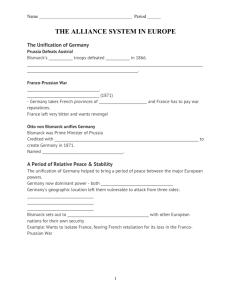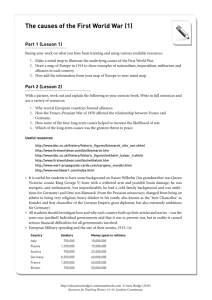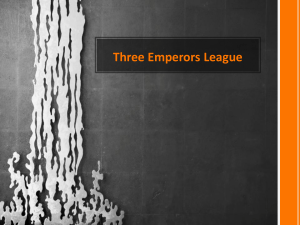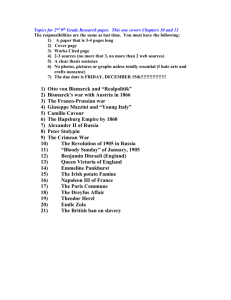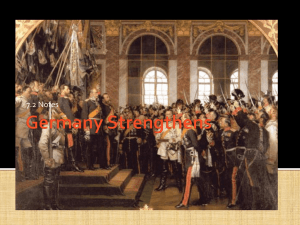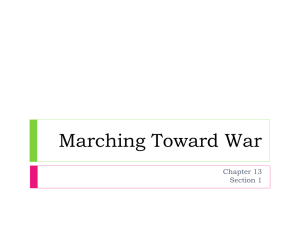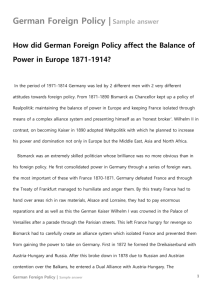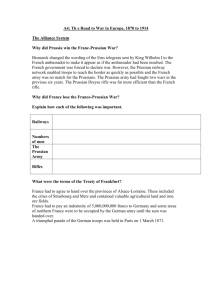48 - Alliance System
advertisement
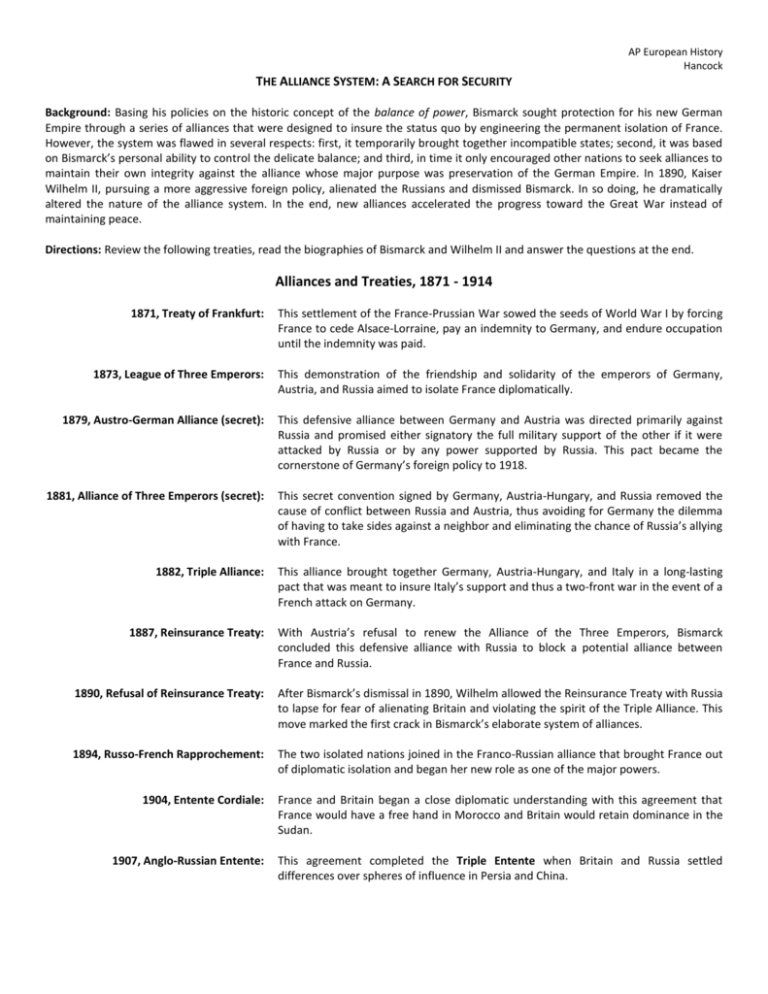
AP European History Hancock THE ALLIANCE SYSTEM: A SEARCH FOR SECURITY Background: Basing his policies on the historic concept of the balance of power, Bismarck sought protection for his new German Empire through a series of alliances that were designed to insure the status quo by engineering the permanent isolation of France. However, the system was flawed in several respects: first, it temporarily brought together incompatible states; second, it was based on Bismarck’s personal ability to control the delicate balance; and third, in time it only encouraged other nations to seek alliances to maintain their own integrity against the alliance whose major purpose was preservation of the German Empire. In 1890, Kaiser Wilhelm II, pursuing a more aggressive foreign policy, alienated the Russians and dismissed Bismarck. In so doing, he dramatically altered the nature of the alliance system. In the end, new alliances accelerated the progress toward the Great War instead of maintaining peace. Directions: Review the following treaties, read the biographies of Bismarck and Wilhelm II and answer the questions at the end. Alliances and Treaties, 1871 - 1914 1871, Treaty of Frankfurt: This settlement of the France-Prussian War sowed the seeds of World War I by forcing France to cede Alsace-Lorraine, pay an indemnity to Germany, and endure occupation until the indemnity was paid. 1873, League of Three Emperors: This demonstration of the friendship and solidarity of the emperors of Germany, Austria, and Russia aimed to isolate France diplomatically. 1879, Austro-German Alliance (secret): This defensive alliance between Germany and Austria was directed primarily against Russia and promised either signatory the full military support of the other if it were attacked by Russia or by any power supported by Russia. This pact became the cornerstone of Germany’s foreign policy to 1918. 1881, Alliance of Three Emperors (secret): This secret convention signed by Germany, Austria-Hungary, and Russia removed the cause of conflict between Russia and Austria, thus avoiding for Germany the dilemma of having to take sides against a neighbor and eliminating the chance of Russia’s allying with France. 1882, Triple Alliance: This alliance brought together Germany, Austria-Hungary, and Italy in a long-lasting pact that was meant to insure Italy’s support and thus a two-front war in the event of a French attack on Germany. 1887, Reinsurance Treaty: With Austria’s refusal to renew the Alliance of the Three Emperors, Bismarck concluded this defensive alliance with Russia to block a potential alliance between France and Russia. 1890, Refusal of Reinsurance Treaty: After Bismarck’s dismissal in 1890, Wilhelm allowed the Reinsurance Treaty with Russia to lapse for fear of alienating Britain and violating the spirit of the Triple Alliance. This move marked the first crack in Bismarck’s elaborate system of alliances. 1894, Russo-French Rapprochement: The two isolated nations joined in the Franco-Russian alliance that brought France out of diplomatic isolation and began her new role as one of the major powers. 1904, Entente Cordiale: France and Britain began a close diplomatic understanding with this agreement that France would have a free hand in Morocco and Britain would retain dominance in the Sudan. 1907, Anglo-Russian Entente: This agreement completed the Triple Entente when Britain and Russia settled differences over spheres of influence in Persia and China. Otto von Bismarck (1815-1898) Otto von Bismarck created and molded the German empire. He was a powerfully built Prussian Junker who was sophisticated, intellectual, and sensitive to the point of hysteria; but he was also a despairing conservative who had no faith in the future, and like Metternich saw the new movements of liberalism and democracy as evil. He had a singular goal: the unification of Germany. This unity was realized in such a way as to make Prussia supreme in Germany, the King supreme in Prussia, and Bismarck essentially supreme over the King. Understanding the art of the possible, he waged a series of wars that were calculated to forge the new nation, and then he developed a system of alliances to secure the status quo and preserve his creation. His system of alliances preserved peace, but it also created the imbalance and tension that was in large part responsible for World War I. As a Junker he understood absolute obedience to his sovereign and was schooled in a toughness of mind that allowed him to batter down any politician or theory that dared to cross him. Thus he crushed any moves toward a more democratic government. As a sensitive intellectual he was determined to stay in power to insure the continuation of his treasured German Empire. In 1890 in confrontation with a new Ruler, Bismarck was dismissed from his position as Imperial Chancellor. The machinery that he had introduced to continue a world with himself at the helm, now fell into more unreliable hands. And thus a British politician could say of him: “He made Germany great and Germans small.” ----- Kaiser Wilhelm II (1859-1941) Wilhelm became German Kaiser (Emperor) and King of Prussia in 1888 and reigned until his fall at the end of World War I in 1918. He was a megalomaniac whose madcap personality also fit the expressions of intense German nationalism that antedated the Great War. German nationalism needed a figure of heroic proportions who would lead the new country to deeds of romantic glory. Wilhelm fit the bill with his grandiose belief in his own importance, his love of uniforms, and his intense restlessness. Familiar problems led him to an endless desire to best his English relatives (through his mother he was the grandson of Queen Victoria) and find a place in the sun for the German Empire. The imperial government forged by Bismarck had placed supreme executive and military power (Kommando Gewalt) in the hands of the Kaiser; and once Bismarck was gone, the ruler could in fact exercise these unrestrained. As he himself said, “As for having to sink my ideas and feelings at the bidding of the people that is a thing unheard of in Prussian history or the traditions of my House. What the German Emperor, King of Prussia thinks right and best for his people he does.” Determined to show imperial might, he pursued a course of Weltpolitik (world politics) that had no real goals beyond “glory.” In so doing, he created numerous moments of international tension, which could be summed up by the comment of the British politician, Earl Grey: “The German Emperor is like a battleship with steam up and screws going, but with no rudder, and he will run into something someday and cause a catastrophe.” 1. What were Bismarck’s goals? _________________________________________________________________________ __________________________________________________________________________________________________ __________________________________________________________________________________________________ 2. What were the major goals of Wilhelm II in leading the German nation? ______________________________________ __________________________________________________________________________________________________ __________________________________________________________________________________________________ 3. How did the dismissal of Bismarck change the fortunes of Europe? ___________________________________________ __________________________________________________________________________________________________ __________________________________________________________________________________________________ 4. What became the new line-up of European nations after the dismissal of Bismarck? _____________________________ __________________________________________________________________________________________________ __________________________________________________________________________________________________ 5. What were obvious strengths and weaknesses of each grouping of nations? Triple Alliance: _____________________________________________________________________________________ __________________________________________________________________________________________________ Triple Entente: _____________________________________________________________________________________ __________________________________________________________________________________________________ 6. Why did the new balance bring together such incompatible partners? ________________________________________ __________________________________________________________________________________________________ __________________________________________________________________________________________________

